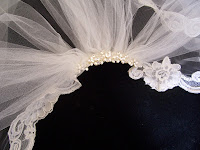True bridal beauty
This is not the time when we think of weddings, but one of the points here was recounted in this morning's shiur by Rabbi Frand, and the theme was the 9 Days, so do bear with me. .
The traditional praise sung for a bride is "kallah na'ah vechasudah" [the bride is pleasant in appearance and kind] (rather like the fairy-tale descriptions that say "she was as good as she was beautiful"). Certainly, brides aspire to look their best for their wedding day. Some even demand that the women around them only wear certain colors to set them off in what they consider a flattering setting. But the Jewish ideal of beauty is not that of a self-absorbed bridezilla (a word Rabbi Frand brought up in his talk).
Rabbi Frand recounted a story that a rabbi from Dallas told him. The source of the story was a pediatrician who worked in a hospital emergency room in Israel. She said that one day a bride came in in full bridal regalia --the gown, veil, etc. She asked why she had come. It wasn't because she was coming to check on a particular child that she knew. She came into the hospital practically en route to her chuppah because she wanted to use the power of bracha given to bride and groom to push for the recovery of all the children there.
Now that t really was an amazing [and I don't use that word lightly] thing. Most brides are totally self-absorbed on their wedding day, concerned to avoid the possibility of a hair being out of place. But this one saw her role not just as a beautiful bride but as a spiritual power source that she intended to use in the best possible way.
This reminded me of a much older story of a bride who thought of others on her wedding day, as recounted in Shabbat 156b:
For more insight into the significance of the Jewish wedding, see http://kallahmagazine.weebly.com/
Follow me on Twitter @AriellaBrown and circle me at Google+
The traditional praise sung for a bride is "kallah na'ah vechasudah" [the bride is pleasant in appearance and kind] (rather like the fairy-tale descriptions that say "she was as good as she was beautiful"). Certainly, brides aspire to look their best for their wedding day. Some even demand that the women around them only wear certain colors to set them off in what they consider a flattering setting. But the Jewish ideal of beauty is not that of a self-absorbed bridezilla (a word Rabbi Frand brought up in his talk).
Rabbi Frand recounted a story that a rabbi from Dallas told him. The source of the story was a pediatrician who worked in a hospital emergency room in Israel. She said that one day a bride came in in full bridal regalia --the gown, veil, etc. She asked why she had come. It wasn't because she was coming to check on a particular child that she knew. She came into the hospital practically en route to her chuppah because she wanted to use the power of bracha given to bride and groom to push for the recovery of all the children there.
Now that t really was an amazing [and I don't use that word lightly] thing. Most brides are totally self-absorbed on their wedding day, concerned to avoid the possibility of a hair being out of place. But this one saw her role not just as a beautiful bride but as a spiritual power source that she intended to use in the best possible way.
This reminded me of a much older story of a bride who thought of others on her wedding day, as recounted in Shabbat 156b:
R' Akiva recognized that her act of charity is what saved her from the death sentence. Charity does have that power in general, but it is particularly striking for a bride to take note of someone that everyone else is ignoring rather than just thinking "It's my special day and not my job to take care of someone else."
Astrologers told R' Akiva that his daughter was doomed to die from a snakebite on her wedding day. [If this were a fairytale, you can imagine he'd prevent her from having any contact with anyone who may wish to marry her, but this is the Talmud, so the story goes very differently.] Nevertheless, R' Akiva's daughter became betrothed. On the day of her wedding, she stuck her brooch into the wall. The following morning, when she took the brooch out, she found the snake that had been killed when the pin penetrated it. ‘What did you do?’ her father asked her. ‘A poor man came to our door in the evening.’ she said. ‘Everyone was busy at the banquet, and no one attended to him. So I took the portion which was given to me and gave it to him.
For more insight into the significance of the Jewish wedding, see http://kallahmagazine.weebly.com/
Follow me on Twitter @AriellaBrown and circle me at Google+

Comments